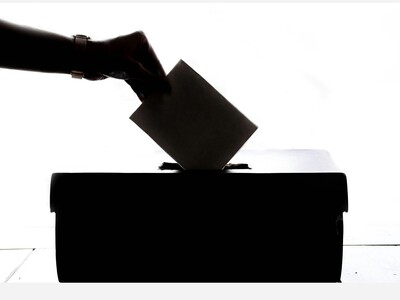The Fine Print: Protecting Dissent in an Age of Fear
Welcome to my monthly opinion column, The Fine Print, where I dive into a law, policy, or court case and break down how it actually affects our world today, both nationally and locally. From Supreme Court rulings to Congressional legislation, I connect the dots between legal decisions and real life. As a local high school student passionate about law and current events, I’m here to make sense of the legal world, one case at a time.
Amidst rising fears of communist influence in the U.S. at the beginning of the Cold War, in 1947, President Truman passed Executive Order 9835 (also known as the “Loyalty Order”). The Democratic Party had been accused of being “too soft” on communism, which, at the time, was widely viewed as being a threat to American democracy. With an opportunity for re-election coming up in 1948, Truman passed the EO to reassure the public of his anti-communist stance. But in reality, EO 9835 only intensified censorship and fear during the Second Red Scare, foreshadowing the widespread intimidation of government officials begun by Senator Joseph McCarthy and even informing many policies of the current administration regarding the installment of government officials.
EO 9835, or the Loyalty Order, established a “Federal Employee Loyalty Program” with the purpose of finding and removing communists from the U.S. state department and select military agencies. In 1953, President Eisenhower extended the program to all federal employees, including armed forces. The loyalty program authorized background checks and investigations by the FBI into government employees and officials, and if there were “reasonable grounds” to doubt an employee’s loyalty, they could potentially be dismissed. According to the Truman Library, between 1947 and 1956, over five million federal workers were screened, 2,700 of whom were dismissed, and 12,000 of whom resigned from their positions. None of these investigations revealed a spy. Worse, even beyond those directly at risk, the program suppressed the freedoms and civil liberties of many other government employees by forcing them to live under constant threat of dismissal. Although fears about the spread of communism were allegedly the basis for the loyalty program, the program was subjective and inconsistent, with many individuals targeted based simply on political beliefs or memberships in groups seen as being leftist or “radical”.
It is important to recognize that government employees are subject to some restrictions on their freedom of speech that may not apply to private citizens. Especially during times of war, the government may have a legitimate interest in limiting the free speech of its employees, for the purpose of maintaining vital efficiency and productivity. This interest has long been recognized by the Supreme Court, since Schenck v. United States in 1919 decided that public and government speech can be limited if it poses a “clear and present danger” to national security. Whistleblowing and political endorsements are often restricted based on this test. But rather than identifying Soviet spies who believed in “destroying American democracy” and thereby serving a legitimate government interest, the program had the practical effect of limiting discussion involving any “leftist” perspectives, which would not have passed the “clear and present danger” test.
EO 9835 was passed during a time of war in America, informing the uncertainty and paranoia characteristic of the time period. As a result, “loyalty” was wrongly defined as avoiding opposition to the majority’s ideals, rather than remaining devoted to one’s country without necessarily compromising individual beliefs. Today, the major conflict defining our nation is a culture war, pitting the “conservative right” against the “liberal left”. But the Trump administration’s definition of “loyalty” mirrors the older definition used during the Cold War, prioritizing absolute agreement with all of Trump’s values while weaponizing fear to eliminate dissenting opinions.
It is certainly not uncommon for U.S. leaders to fill government positions with individuals aligned with their goals. The problem lies in today’s extreme, as The New York Times reports that many applicants for positions in the Pentagon and the intelligence agencies have been asked questions “designed to assess their loyalty to [President] Donald J. Trump” to conclude their interviews. Interviewers have even gone so far as to ask which candidate applicants supported for president in the past three elections, their opinions on the events of January 6th, 2021, and whether or not they believed the 2020 election was “stolen”. They intuited that there was a right and wrong answer for each question. Trump has also directly fired many officials he believes to be disloyal, replacing them with “Trump loyalists” who will neither oppose nor question the President’s policy decisions. The Trump administration’s turnover outpaces all five of his predecessors.
Considering that the majority of federal employees work in non-partisan positions, this campaign poses many of the same problems that ran rampant after the passage of EO 9835. The culture of fear that was developed throughout the government due to a fear of being dismissed stifled free speech and reduced necessary bipartisan influence in government. The ensuing spread of paranoia to the public was brought on by attacks on private citizens, which can be compared to Trump’s attacks on prosecutors, immigrants, state policies, and private educational institutions regarding DEI initiatives and other programs or individuals he deems “too liberal”, often overstepping his constitutional authority as president.
These attacks could soon hit closer to home. This past March, the West Windsor-Plainsboro School District took an important stand, passing a resolution reaffirming an unwavering commitment to DEI (diversity, equity, and inclusivity), despite recent federal pressure to remove it from education. But retaliatory reductions in funding given to New Jersey schools by the federal government could jeopardize accessible and healthy meal plans, special needs programs, and academic resources across the state. The Trump administration’s push for deportations has also had consequences for both documented and undocumented immigrants in Mercer County, many of whom are students. According to New American Economy, in total, immigrants make up at least 23% of Mercer’s population, which is why the WW-P school district also included a statement affirming the rights of immigrant students to attend school safely and without fear. Continuing to take action by speaking out and sharing dissenting opinions in this way is the best strategy to ensure our civil liberties remain intact. It was largely due to the brave reporting of journalists that the ineffectiveness and dangers of McCarthyism were revealed and the Federal Employee Loyalty Program was dismantled. It will require the efforts of educational institutions, companies, and individuals to continue that legacy.
In the end, true loyalty to one’s country cannot be defined by fear. In fact, the best way to demonstrate commitment and dedication to one’s nation is to work tirelessly for national improvement, to seek out injustices and work to eradicate them, which requires passion for growth and a desire for collective progress. Essentially, responsible dissent is the most effective way to protect American democracy. By removing all dissenting opinions from positions of power, President Trump has effectively isolated himself from the possibility for positive change.









